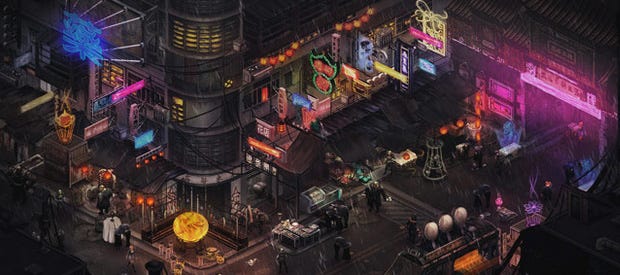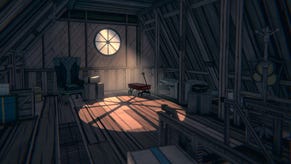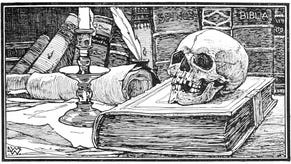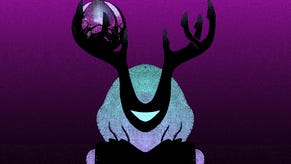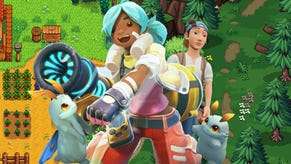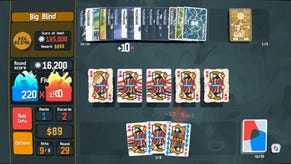Shadowrun Devs On Hong Kong, Kickstarter, Fans & Story
Third time lucky. And first and second too.
Shadowrun just keeps on returning. The cyberpunk RPG has has various game adaptations over the last few decades, but it was the Kickstarted Shadowrun Returns which most nailed the concept. Narrative and choice expanded in excellent follow-up campaign Dragonfall, which then saw a further improved Director's Cut, and after all that devs Harebrained Schemes had a loyal enough fanbase to pull off their third successful Kickstarter, even in an age where there's a lot of worried muttering about the future of crowd-funding for games. No such worries for Harebrained co-founders Jordan Weisman and Mitch Gitelman, whose upcoming Shadowrun: Hong Kong was funded in less than two hours and now has over $600k pledged - six times what they'd asked for. Blimey.
Earlier this week, I talked to the pair about why they went back to the Kickstarter well, what they're doing differently this time, how they've been able to make story an increased focus, what the community's up to with the Shadowrun editor and being sent free pizza.
RPS: Obvious question, but why Kickstarter again? Did you actually need to?
Jordan Weisman: We went back to Kickstarter because for two reasons really. One financial and one emotional. We really had a spectacularly positive experience working with our backers on the creation of Shadowrun Returns, Dragonfall and Golem Arcana. In all those experiences, our backers were really fantastic resources and sounding boards, and cheerleaders during development, which can sometimes be gruelling and dire. Having an excited audience with you during that process both makes the game better and makes it more fun to make.
Mitch Gitelman: Our backers would buy us pizza when we were working late, and they would buy us bagels when we were working the weekends.
Jordan: Sometimes in game development you're sat they're slaving away, and you're like "does anybody give a damn?" Here, we had people with us throughout the entire experience, responding to our ideas, helping us hone them and being such positive supports. This Kickstarter's very different than the other two, where we really asking them to help us fund the entire experience. Here, through being fortunate that the games have sold pretty well after we brought them out, we were able to fund a very good size Shadowrun Hong Kong ourselves. But there were a number of features which our budget didn't allow us to add, and those were what we brought to the audience and said 'if you guys would like these features added to the game and content and this additional material that we weren't able to fit in our budget, please chip in.' It really became a co-funding proposition, which is very different from what is traditionally done in Kickstarter.
RPS: Do you know roughly what proportion of people who backed Shadowrun Returns are now backing Hong Kong?
Mitch: It's really hard to compare data. From our comments page we've gotten quite a few return people, but what's really heartening is the number of new people coming on. What's even more rewarding is the reception they're getting from the older school people. It's like "welcome to the club!" and tell them everything and answer all their questions for them. It's pretty cool.
RPS: That sort of thing isn't exactly a given in gaming communities either.
Mitch: No. It's not. [Laughs]. Our audience is amazing. They're really cool people, and they get what we're doing and that we really care about this setting and telling stories in it.
RPS: You've hit a bunch of the stretch goals already - how representative are the sums you tied to them of what the extra stuff will actually cost? Or is it 'well, we'll do something?'
Mitch: That was our first Kickstarter [laughs]. We made that one up as we went along. Now that this is our third successful Kickstarter, we did much better planning than on the previous ones. Every single thing in our stretch goals is part of a product plan, part of a budget we put together, saying that if we're gonna hit this we're going to need this much money. We really did our homework.
RPS: So you approach Kickstarter as a structured business plan rather than just a shot in the dark?
Mitch: The first one was really Wild West. We were in the Oregon Trail, trying not to get dysentery.
Jordan: Because it was early days of Kickstarter and so we really had no idea what the potential was. We didn't understand the necessity for planning, so we were making up stretch goals as we went along and then killed ourselves to live up to all of them. This time, it's our third Kickstarter but it's also our third Shadowrun campaign. We have a much better handle on what things really cost to do, and that's what made this much more informed of a process.
RPS: So you don't even need anyone to send you pizza this time?
Mitch: That's what it feels like. Kickstarters are really exciting, but at least this one isn't manic. Nobody's scrambling. We're very, very busy trying to keep up with the volume of mail that we receive, and comments on the forum and on the Kickstarter page. It's still an emotional rollercoaster and a tidal wave of work. Because of the way that we feel about our audience we do our best to answer every single question.
RPS: What's your main objective with the new game, other than 'more Shadowrun' and moving the setting to Hong Kong?
Jordan: What's great about Shadowrun is that it's a world that really revolves around pretty dark and interesting questions and characters. So Hong Kong is an absolutely fascinating backdrop and setting for the game, and it gives us unique environmental tools to help tell the story, but what people have responded so powerfully to in the previous two Shadowrun games is the characters and their stories. The emotional stuff and the corporate intrigue, and everything which informs their actions, and the decisions that you as a player get to make. Ultimately, in a roleplaying game, that's what makes it interesting - having to make morally complex selections and choices as you navigate through this world. The Hong Kong setting is enormously dynamic, but it is a dynamic backdrop to what has to be a great story. If we hadn't identified that great story we wouldn't' be on Kickstarter.
That's our primary thing. We came up with a story and a setting that our audience had told us they were excited about, and then we needed to make it. The other part is we love getting better. The first Shadowrun, we created the entire engine and shipped the first campaign all on one super-accelerated, excited thrust. We did in less than a year. Then the second one, with a much more stable toolset, we were able to improve on that, and add features, add depth of storytelling, add much more non-linear storytelling. And now, coming back a third time, we get to add more to that base engine and even deeper in our storytelling.
RPS: The impression I got from the first Shadowrun Returns was that it was almost stuck on the fence between being a roleplaying systems game and a narrative game. By this point how much more sure are you about what it should be first and foremost?
Jordan: No, our goal was always to have very rich narratives. That's what excites Mitch and I, we love that storytelling. I think as you said though, the challenge was that we needed to build a strong backbone to the engine and we knew we wanted strong tactical interaction, but we were also developing this editor so that players could develop their own stories. That is something we were excited to enable, because Shadowrun as a tabletop RPG has always been about everybody being able to tell their stories, not just us. It's a shared universe. But we frankly underestimated how much extra load that was going to be to do, to create a releasable editor. So the time for us to tell our story got shorter, so what ended up in the first Shadowrun returns was maybe 40% of what we had already written. That's also why it was more linear than we intended.
Mitch: Sorry, it was actually 25% [laughs]. I went back and did the maths.
Jordan: Yeah. And all that's a matter of learning your engine and learning your tools, so when we went back to do Dragonfall we are able to tell a much richer and less linear story.
Mitch: And now that we're doing Hong Kong, we're building on that experience again. Besides building on all the great features that went into the Dragonfall Director's Cut, and all the changes that we made and the upgrades that we made, our process for creating these stories and these characters has evolved. We've got sort of a toolset for how to come up with the stories, which makes it much easier for us. It got much, much faster.
RPS: Is the balance what you expected in terms of people waiting for new stuff from you rather than the community making their own stuff? Admittedly I'm not at all embedded in the community, but I don't hear too much about fan-made content.
Mitch: There's some really great user-generated content on the Steam workshop. Jordan and I have done a lot of let's play videos playing them, but we also do something called Shadowlab where we play people's content and give them feedback so they can improve it. The audience really enjoys that, and really looks forward to those.
RPS: How honest are you really?
Mitch: Seriously, you gotta watch these videos, we're laughing our asses off and having a lot of fun playing these things.
Jordan: What's great about user-generated content is the inventiveness and creativity with which they approach things. They're using our tools in ways we didn't even think of. I remember the first time that we saw somebody hijack a character, thrown them in a van and then the van go in a ride. We didn't know you could do that!
Mitch: The next scene was the interior of the van, kind of like the A-Team, the characters all bouncing along.
Jordan: It was just really clever.
Mitch: To directly answer your question, the majority of the audience is interested in HBS-created content.
Jordan: It's kind of the YouTube to feature film analogy. We've enabled people to make really brilliant YouTube stuff, but they don't have the time, the budget or the team to put the polish and scope on it that we do. That's why most of the audience is going to be excited about what the equivalent of a feature film is.
Mitch: There are a couple of user-generated projects which are taking it very seriously and are going very slowly. They're not just trying to put something up as quickly as possible, and they're actually working as a virtual team. I think they could have some very impressive offerings.
RPS: Between what these guys are doing and what you're doing yourself, to what extent has Shadowrun now fully become a videogame entity, how much has it shifted away from what it originally was?
Jordan: Well, Shadowrun was a videogame pretty early in its career. Back in 1992 and 93. The kind of adaptations you do when you move from one medium to another, in those days they were far more severe than the kind of adaptations we're making here. In terms of the processing power. One of the things we're excited about is we believe we've been able to be much truer to the spirit and in most cases the actual mechanics of the tabletop game, but still offer the accessibility of a videogame, of a CRPG instead of a tabletop RPG. You're always walking that fine line, but I think that our goal was to be able to build on the bones of the paper RPG and open it up to a much wider audience, but hopefully Shadowrun returns has managed to do.
Shadowrun: Hong Kong has another 26 days to go on its Kickstarter. It's brought in over $600k, but has more stretch goals left to unlock.
The second and final part of this interview, in which I pose questions from RPS readers, will follow shortly.
